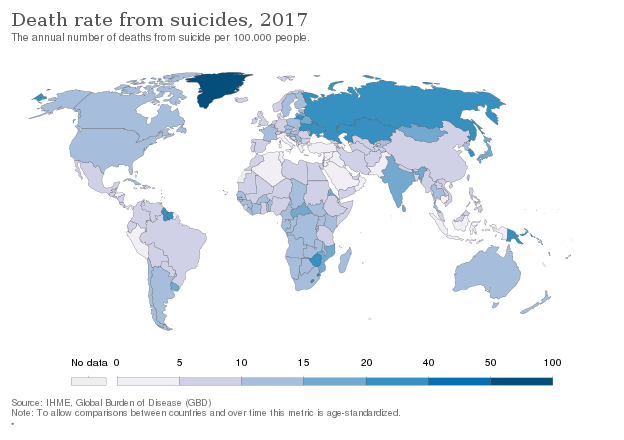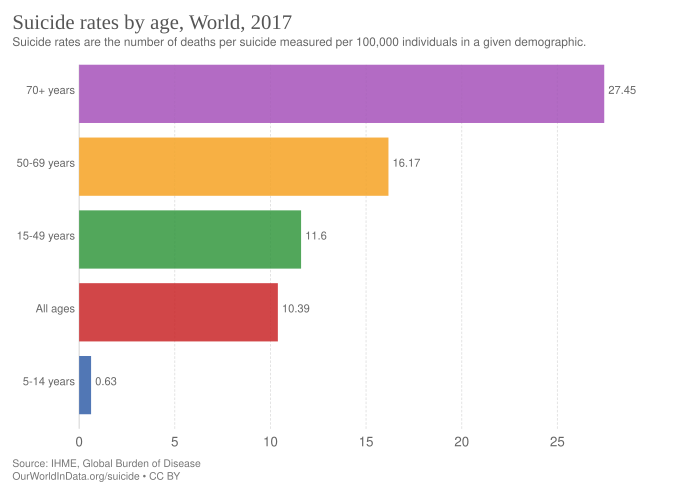Suicide
Suicide is the intentional act of causing one's own death. It is a significant public health issue, affecting individuals worldwide. The usual onset for suicide is between the ages of 15–30 and 70+, with higher prevalence in males than females. Various factors contribute to the risk of suicide, including mental disorders, substance abuse, and socio-economic issues.
Risk Factors
Mental disorders such as depression, bipolar disorder, schizophrenia, personality disorders, anxiety disorders, and substance abuse are primary risk factors for suicide. Physical conditions like chronic pain, traumatic brain injury, and chronic fatigue syndrome also contribute to the risk. Social factors including unemployment, poverty, and discrimination can trigger suicidal thoughts. Genetics accounts for 38% to 55% of suicidal behaviours.
Pathophysiology
Suicide results from a complex interplay of behavioural, socio-economic, and psychological factors. Low levels of brain-derived neurotrophic factor (BDNF) and serotonin are associated with suicide. Epigenetic changes in response to environmental factors also play a role in determining suicide risk.

Prevention
Effective suicide prevention includes treating mental disorders and substance misuse, limiting access to suicide methods, and improving social and economic conditions. Cognitive behavioural therapy (CBT) and dialectical behaviour therapy (DBT) can improve outcomes in those with suicidal thoughts. Crisis hotlines and follow-up care for those who have attempted suicide may also be beneficial.

Treatment
Treatment for those at risk of suicide involves addressing underlying mental health conditions. Hospitalisation might be necessary for those who are actively suicidal, and outpatient mental health treatment can be arranged for those at lower risk. Dialectical behaviour therapy (DBT) and certain medications like lithium and clozapine may help reduce suicidal thoughts.
Methods
The leading methods of suicide vary by region and include hanging, pesticide poisoning, and firearms. Hanging is the most common method in many countries, accounting for 53% of male suicides and 39% of female suicides. Pesticide poisoning is prevalent in developing countries, while firearms are more common in the United States.

Epidemiology
Globally, suicide accounts for approximately 1.4% of all deaths, with a mortality rate of 11.6 per 100,000 persons per year. Rates differ significantly by country and demographics, with higher rates observed in men, particularly elderly men. The countries with the highest rates include Greenland, Lithuania, Japan, and Hungary.

Social and Cultural Aspects
Views on suicide are influenced by cultural, religious, and philosophical perspectives. In many religions, suicide is considered a sin. Legal perspectives on suicide vary, with some countries decriminalising it, while others maintain penalties for attempted suicide.

Self-assessment MCQs (single best answer)
What is the usual onset age range for suicide?
Which mental disorder is NOT listed as a primary risk factor for suicide?
What percentage of suicidal behaviours is attributed to genetics?
Which neurotransmitter's low levels are associated with suicide?
What is a primary method of suicide prevention?
Which therapy is specifically mentioned as helpful for individuals with suicidal thoughts?
Which medication is noted for reducing suicidal thoughts?
What is the most common method of suicide in many countries?
Which country is listed as having one of the highest suicide rates?
What is the global mortality rate from suicide per 100,000 persons per year?
Dentaljuce
Dentaljuce provides Enhanced Continuing Professional Development (CPD) with GDC-approved Certificates for dental professionals worldwide.
Founded in 2009 by the award-winning Masters team from the School of Dentistry at the University of Birmingham, Dentaljuce has established itself as the leading platform for online CPD.
With over 100 high-quality online courses available for a single annual membership fee, Dentaljuce offers comprehensive e-learning designed for busy dental professionals.
The courses cover a complete range of topics, from clinical skills to patient communication, and are suitable for dentists, nurses, hygienists, therapists, students, and practice managers.
Dentaljuce features Dr. Aiden, a dentally trained AI-powered personal tutor available 24/7 to assist with queries and provide guidance through complex topics, enhancing the learning experience.
Check out our range of courses, or sign up now!


